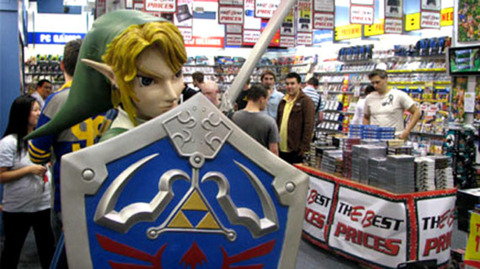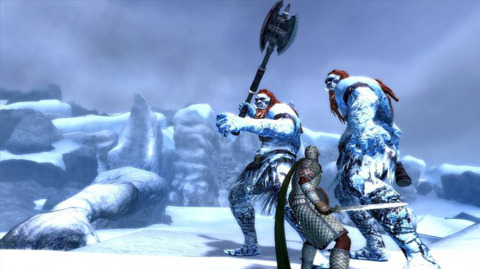Playing By the Rules: Classifying Online Video Games in Australia
In this GameSpot AU feature we look at the laws behind online-only game classification in Australia.
It won’t come as a shock to anyone to learn that the classification of video games in Australia is somewhat of an entanglement. But walk into any game retailer in the country and it is immediately clear that one group of games is without any classification at all: online-only titles like World of Warcraft, Warhammer Online, and Age of Conan. Between vague classification guidelines, an inconsistent Classification Board, the lack of an R18+ rating, and a constant game of pass-the-parcel between Australian government departments toying with the issue, classifying video games in Australia is proving to be a headache for more than just gamers. But are online games and massively mulitplayer online games exempt from classification in Australia? If not, is it then illegal to sell these games without a classification? And if so, why have games like World of Warcraft remained unclassified on shelves for years?
In this GameSpot AU feature we will look at the legislation behind the classification of online games in Australia and speak to the Australian government, the Classification Board of Australia, and Blizzard in a bid to end the confusion once and for all.
Conflicting Reports
At the start of the year a wave of reports surfaced on gaming news Web sites and traditional media outlets questioning the legality of games such as World of Warcraft, Warhammer Online, and Age of Conan due to the fact that these titles were being sold on shelves across Australia without a local classification. Many of these reports claimed that publishers seemed to be unaware that online games that did not have a single-player component needed to be classified in Australia, often referring to this as a “legal loophole.” This seems to have led to the widely accepted view that online games are exempt from classification in Australia. The following was taken from a report by Australian law firm Clayton Utz, published on May 1, 2009, by writers Gina Elliott and Danielle Briers:
“The gaming industry has long assumed that online multiplayer games like these are ‘unclassifiable’ due to the inherent unpredictability of online play, and therefore do not require classification. This assumption has led to countless copies of online multiplayer games being sold without classification over the years, despite legislation which prohibits the sale, demonstration and advertising of unclassified games.”
But little attention was paid to the Australian government, whose repeated stance on the issue was just as widely reported and documented. The Commonwealth Attorney-General’s Department told GameSpot AU:
“The Commonwealth Classification Act does not exclude online games from the definition of computer games. The Classification Board [of Australia] must classify a computer game (including one with online content) upon receipt of a valid application. The Classification Board often uses the consumer advice 'gaming experience may change online' for a computer game with online content.”
To further clarify the issue, the Commonwealth Attorney-General’s Department will soon be releasing a fact sheet on the classification requirements of online video games, following a request put forward by Censorship Ministers in April. The fact sheet, whose release date has not been confirmed, is being developed by commonwealth, state, and territory officers and will be provided to the industry, in the hope that the issue will no longer confuse and mislead.
Legal or Illegal?
If online games are not exempt from classification in Australia, does it follow that unclassified games such as World of Warcraft, Warhammer Online, and Age of Conan are currently being sold illegally in Australia? The short answer is yes. According to the Federal Attorney-General’s Department, it is the law that all video games must have an Australian classification before being sold, hired, displayed, or advertised. However, each state and territory in Australia has its own classification laws, which cover what material is legal; how it is marked, displayed, sold, and advertised; the penalties involved for breaching these requirements; and the policing of these matters.
The penalties differ from state to state; most involve prison terms for individuals and monetary penalties stretching into five-figure sums for companies. However, the actual online content part of a video game is regulated by the Department of Broadband and the Digital Economy, where the Broadcasting Services Act of 1992 regulates illegal and offensive online content, including video games. Under the Online Content Scheme of the Act, illegal or offensive online content can be taken down, regardless of whether it is hosted in Australia or overseas--the Australian Communications Media Authority (ACMA) can ask content providers to remove content if it believes it’s of a serious enough nature, and it must notify the Australian Federal Police if it finds any evidence of wrongdoing.
But if the sale of unclassified video games is a crime, why have these penalties never been enforced? Why are publishers guilty of this offence not being charged and their games taken off the shelves? Since the enforcement of the law is up to each state and territory, GameSpot AU first put this question to the NSW Attorney-General’s Department, whose response, word for word, was: “Call the police.” Judging by this response, we can only assume the NSW Attorney-General’s Department does not attribute enough importance to this issue. Whatever the case, GameSpot AU did contact the police.
“The states and territories are responsible for the enforcement of their own jurisdictional laws relating to classification offences,” said Senior Sergeant Darin Ferguson from the Australian Federal Police.
Sergeant Ferguson could only offer his opinion as to why the issue has gone unnoticed for so long under state and territory police: more serious threats to deal with or just a general lack of knowledge about the existence of the issue. When contacted, NSW Police offered the following explanation:
“There is not a particular unit that deals with breaches of the state classification laws; it is an issue that is dealt with at a local area command (LAC) level, which means it is up to each individual police station to follow leads,” a spokesperson for NSW Police said. Click on the Next Page link to see the rest of the feature!
According to NSW Police, there are a number of ways that the issue can be brought to the attention of the police: complaints, proactive policing such as plain-clothes operations, and other operations which may involve classification breaches. However, there is no way to record if any such cases already exist, because, according to the spokesperson, there is no database of charges laid at the LAC level.
Whatever the reason for this oversight, it’s likely that the undisturbed sale of unclassified games like World of Warcraft, Warhammer Online, and Age of Conan has only served as confirmation of the misconceptions pertaining to the classification of online games in Australia. Whether this has had any bearing on publisher decisions regarding the submission of online titles for classification in Australia is something that remains to be seen.
The Classification Board of Australia
The body responsible for classifying all video games in Australia is the Classification Board, formerly known as the Office of Film and Literature Classification (OFLC). For its part, the Board remains adamant that there is no confusion, or "legal loophole" for that matter, when it comes to the definition of video games; the Board will classify any video game, in whatever format, provided it is submitted with a valid application.
“Both online games and mobile phone games, whether played online or downloaded, are computer games and require classification,” a spokesperson for the Classification Board told GameSpot AU. “Section 5A of the Classification Act sets out the meaning of a ‘computer game,’ and online and mobile phone games fit into this definition.”
According to the Board, the process for submitting an online video game for classification is exactly the same as submitting any other game--publishers need to determine a suitable way in which the Board can view the game, be it via a live demonstration, actual hands-on time with the game, or a disc showing gameplay.
While the Board would make no comment on why the issue of classifying online games in Australia is so often misinterpreted, it did state that it believes the definition of "computer games" in the Classification Act is fine the way it is and does not require a separate clause just for online games.
“The definition is broad enough to cover both online games and mobile phone games. The Board has classified both types of games in the past."
The Board also pointed to the soon-to-be-released fact sheet from the Commonwealth Attorney-General’s Department, which aims to clarify classification requirements for online games in Australia.

The Industry View
Much like a responsible parent giving guidance where it’s most needed, the recently renamed Interactive Games and Entertainment Association (IGEA) represents and looks after publishers and distributors in Australia and New Zealand. To CEO Ron Curry, there is nothing more important than ensuring that his members are abiding by Australian laws and doing the right thing when it comes to classification. However, unlike the Classification Board of Australia or the Commonwealth Attorney-General’s Department, Curry is willing to admit that the issue of online classification for video games in Australia has been anything but clear in the past.
“The video game industry has always tried to ensure it complies with classification legislation, no matter how unclear that may be,” Curry said. “In the past, as the previous OFLC will attest, there was some confusion on what constituted a computer game and therefore what did and didn’t require classification. We need to understand that the Classification Act was introduced in 1995 in a time where CDs were being introduced and online play was still a pipe dream, so it’s only reasonable to expect difficulty classifying today’s content through a 15-year-old lens.”
According to Curry, IGEA members have been submitting online games for classification for some time, and the Classification Board has complied to work with publishers to classify these games accordingly.
“We want to continue to work with the Classification Board and the Commonwealth Attorney-General’s Department to ensure we keep consumers at the centre of our conversations regarding the classification of video games. It’s through this open dialogue that we can all better understand and adapt to the changing and complex nature that the current generation (and beyond) of gaming presents to consumers, regulators and publishers.”
Blizzard and the Classification of World of Warcraft
After sitting on Australian shelves for five years without a classification, Blizzard’s World of Warcraft was classified by the Australian Classification Board in October 2009, receiving an M rating for fantasy violence and variable online content. Both of WOW’s expansions, The Burning Crusade and Wrath of the Lich King, also received an M rating and the same consumer advice.
According to Blizzard Entertainment, the reason behind WOW’s heavily delayed classification was the inability of the previous OFLC to deal with the online content.
“Blizzard Entertainment has always worked closely with the Classification Board for all its titles,” Blizzard told GameSpot AU. “However, back in 2004, we were advised by the Office of Film and Literature Classification (OFLC) that the online-only nature of World of Warcraft was unclassifiable under its definition of computer games at that time."
“Recent changes at the Australian Classification Board have led to their ability to classify online-only games such as World of Warcraft.”
Blizzard’s statement is in contradiction with that of the Australian Classification Board--the Board stated that the definition of "computer games," as written in Section 5A of the Classification Act, is broad enough to include online and mobile games. Given that this definition has remained unchanged since World of Warcraft was released in 2004, GameSpot AU asked the Australian Classification Board to clarify what changes led to its recent ability to classify online-only games.
“The Classification Board has been following developments in online gaming. It is the Board's view that World of Warcraft meets the definition of a computer game provided in the Classification Act and therefore can be classified. This is consistent with the intention of the National Classification Scheme to provide parents and consumers with classification advice on the content of games.”
Moving Forward
Blizzard Entertainment’s acknowledgment that World of Warcraft was turned away from the Office of Film and Literature Classification (OFLC) in 2004 because it was “unclassifiable” signals that inconsistency was present in the classification system of Australia at one stage, however organised and down the line the Board’s stance may be now.
Whatever its past position, the Board now appears to have a strong idea of what constitutes a "computer game," and given the recent classification of World of Warcraft, the Board appears to be willing to work together with publishers to classify everything that is submitted.
What this means for the future of classification in Australia remains to be seen. What are your thoughts on the classification of online games? Submit your comments below!
Got a news tip or want to contact us directly? Email news@gamespot.com





Join the conversation